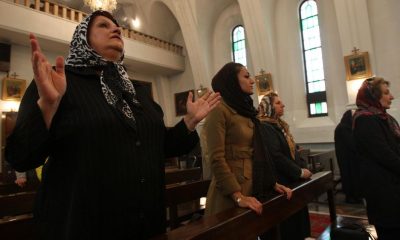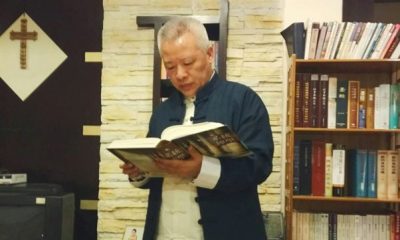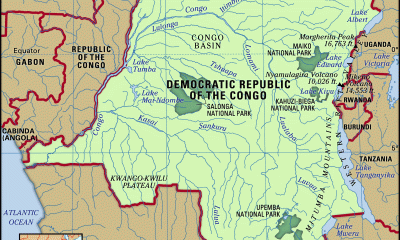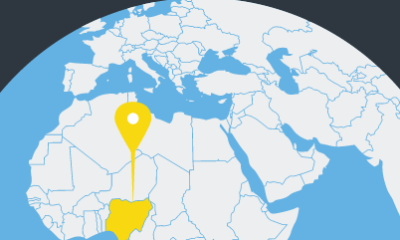world news
War on Christians in Mozambique
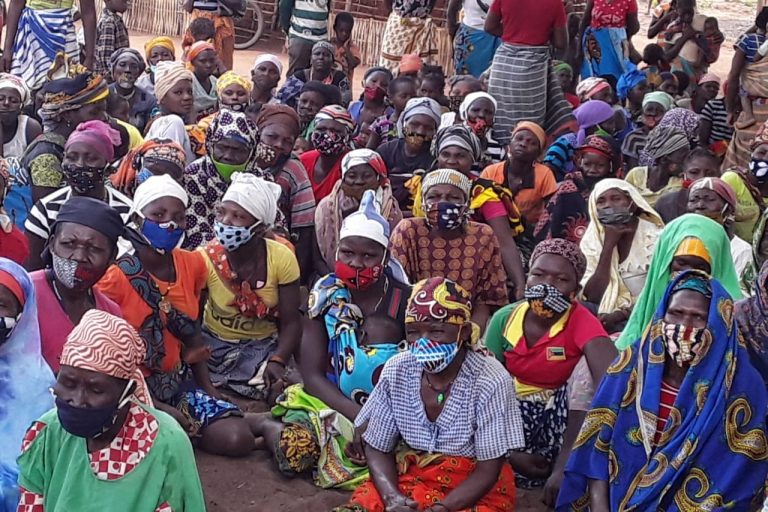
Mozambique – Historically, Mozambique has been a country characterized by primarily peaceful co-existence between Christians and Muslims. The Constitution safeguards religious freedom and the right to worship according to one’s beliefs. As a secular nation, religious discrimination is prohibited. Once a Portuguese colony, Catholicism was first introduced following the slave trade. Today, Christians account for 50% of the population, with 33% of the population being Evangelical and Pentecostal, 27% Roman Catholics, and around 20% Muslim. [1]
Everything changed in 1917, when armed militants, named IS-M, bearing the Islamic State flag, began to wrench havoc predominately in the northern Mozambique province of Cab Delgado.
“The rise of IS-M was in part due to the radicalization of young men who had studied Islam abroad, where they received more fundamentalist religious training. Upon return to Mozambique, they recruited other disenfranchised young men to join their ranks. In June 2019, IS-M pledged allegiance to ISIS, affiliated with its Islamic State-Central African Province. Since that time, IS-M has conducted numerous deadly attacks primarily aimed at Christians.” [2]
Depending on the source, an estimated 1,800 to 3,000 Christians have been murdered in northern Mozambique since October 2017 in ongoing anti-Christian violence. [3] [4] Additionally, almost a million people have been displaced due to the violent attacks. Christians, primarily farmers, have had villages burned and crops destroyed, endangering the food supply and thus creating an “acute hunger crisis.” IS-M militants have also disrupted natural gas supplies. [5]
Recently, these attacks have increased at an alarming rate and frequency as the numbers of IS-M (also referred to as al-Shabab) have grown to several thousand. They have become increasingly sophisticated in their military operations, tactics, and weaponry, reportedly embedding intelligence cells within the Mozambican military. The situation is exacerbated by porous borders, with neighboring countries providing an influx of IS al-Shabab affiliates. The Mozambican government blames the violent attacks on foreign terrorists while downplaying the role of local IS-M elements. As the IS-M organization has grown in strength and level of brutality, it has broadened its international ties and financial base through illicit activities, including extortion and kidnapping. While most attacks continue to occur in the northern region of Cabo Delgado, IS-M is encroaching on neighboring provinces rich with natural resources. [6] Together with Christians, prominent local Muslim leaders have condemned these attacks, forming a coalition to address the conflict and support those adversely affected.
The international community has also intervened. In response to the growing insurgency, the Southern Africa Development (SADC), Rwanda, and the European Union have deployed troops and provided training to assist the Mozambican government. But these efforts have been compounded by the distrust of central government by regional leaders and the general population. [7]
The village of Ntontwe has been attacked several times by jihadists. In one attack, 43 homes were burned, and three people were killed. The village is located close to a major military base of Rwanda’s armed forces, but they arrived too late. “The Rwandan troops came to help us, but when they arrived, the insurgents had already done everything they wanted,” the village leader added. [8]
“On August 6, 2021, US Secretary of State Antony Blinken announced the designation of IS-M leaders Bonomade Machude Omar and Ibn Omar as ‘Specially Designated Global Terrorists’ under Executive Order 13224. Such a designation freezes all assets and blocks financial transactions with these individuals.” [9]
The United States State Department website states: “After terrorist attacks began to destabilize northern Mozambique in 2017, the United States provided assistance to hundreds of thousands of internally displaced persons (IDPs), in addition to working with Mozambican partners to address the drivers of terrorism, even as the security situation has improved in recent years. The United States and Mozambique share a commitment to regional security and stability, economic development, and improved living standards for all Mozambicans.” [10] However, given the increase in violent attacks in 2024 alone, I would suggest that security and stability have declined. Mozambique is also glaringly absent from the 2024 US Commission on International Religious Freedom Report. [11]
Following a visit to Mozambique, Gaviria Betancur, the UN Special Rapporteur on the human rights of internally displaced persons, stated, “While the Government is now geared toward development initiatives for IDPs and host communities, these should complement, rather than come at the expense of protection and humanitarian assistance since the basic needs of the people still remain acute,” the expert noted. She continued, saying, “significant protection and humanitarian challenges remain, especially in the conflict-affected northern provinces of the country. [Author’s note: this UN report does not reference jihadists or terrorist attacks, rather refers to “conflict.”] Continued protection analysis of the situation and humanitarian response to displaced populations are crucial to identify and mitigate negative coping mechanisms affecting groups in vulnerable situations, including children, women and girls, persons with disabilities and older persons.” [12] Some reports indicate that 20% of Christian girls aged 13-17, in the northern region particularly, are vulnerable to being kidnapped and forced to marry a Muslim man. [13]
For the first time in 2021, Mozambique was included on the World Watch List published by Open Doors, Inc. It ranked 45 among the top 50 worst countries for persecution of Christians. This year, 2024, Mozambique moved up to the 39th place, indicating the dramatically worsening persecution of Christians. [14]
On January 4, 2024, IS-M launched a campaign against Christians, “And Kill Them Wherever You Find Them.” Within a week, eight “operations” were carried out against Christians in Mozambique’s northern Cabo Delgado province, resulting in 10 Christians murdered and more than 200 houses burned. [15] Between January 4 and February 12, 2024, a composite of multiple reports indicate that IS-M militants carried out attacks resulting in at least 22 murders (including one beheading), one abduction, 237 homes burned, five churches burned as well as a hospital, Christian school, military installations, and other infrastructure buildings burned. [16] [17] [18] [19] These attacks are occurring with little deterrence and counterattacks, leaving Christians at the mercy of IS-M jihadists. This is truly frightening and warrants international condemnation and intervention.
On Feb 12, 2024, a passenger bus was shot at in Cabo Delgado province, killing the driver, and the attackers left the following note for the passengers. [20]
We as the body of Christ must stand with and pray for our persecuted brothers and sister in Mozambique, many of whom have lost everything. One pastor whose family had been killed proclaimed: “They can burn our houses, they can burn our food—but they cannot burn Jesus out of me.” [21]
Sources:persecution
world news
ശാരോൻ ഫെലോഷിപ്പ് ചർച്ച് യുഎഇ റീജിയൻ സൺഡേസ്കൂൾ സി ഇ എം സംയുക്ത വാർഷികവും സൺഡേ സ്കൂൾ ഗ്രാജുവേഷനും നടന്നു

ഷാർജ: ശാരോൻ ഫെലോഷിപ് ചർച്ച് പുത്രിക സംഘടനകളായ സണ്ടേസ്കൂൾ അസോസിയേഷൻ്റെയും ക്രിസ്ത്യൻ ഇവാഞ്ചലിക്കൽ മൂവ്മെൻ്റിൻ്റെയും (സി ഇ എം) യു എ ഇ റീജിയൻ സംയുക്ത വാർഷികം നടത്തി. 08-02-2025 ശനിയാഴ്ച വൈകിട്ട് 6 മണി മുതൽ 10 മണി വരെ ഷാർജ യൂണിയൻ ചർച്ചിൽ വെച്ച് റീജിയൻ സണ്ടേസ്കൂൾ അസോസിയേഷൻ ഡയറക്ടർ പാസ്റ്റർ ബ്ലസൻ ജോർജിൻ്റെ അധ്യക്ഷതയിൽ കൂടിയ യോഗം റീജിയൻ സി ഇ എം പ്രസിഡൻ്റ് പാസ്റ്റർ സന്തോഷ് സെബാസ്റ്റ്യൻ പ്രാർത്ഥിച്ച് ആരംഭിക്കുകയും ശാരോൻ സഭാ റീജിയൻ പാസ്റ്റർ ജോൺസൻ ബേബി ഉദ്ഘാടനം നിർവഹിക്കുകയും ചെയ്തു. റീജിയൻ സി ഇ എം ജോയിൻ്റ് ട്രഷറർ ബ്രദർ ഷാജി എബ്രഹാം സ്വാഗത പ്രസംഗം നടത്തി. അധ്യക്ഷ പ്രസംഗത്തിന് ശേഷം വിവിധ സഭകളുടെ ഗാനം,സ്പെഷ്യൽ പ്രോഗ്രാം,ഗ്രൂപ്പ് സോംഗ്, ഗ്രൂപ്പ് ആക്ഷൻ സോംഗ്, കോറിയോഗ്രഫി, സ്കിറ്റ്,ഷാഡോ മൈം തുടങ്ങിയ വ്യത്യസ്തമായ പ്രോഗ്രാമുകൾ നടന്നു.പാസ്റ്റർ സാം കോശി (അസോ. റീജിയൻപാസ്റ്റർ),പാസ്റ്റർ ഗിൽബെർട്ട് ജോർജ് (റീജിയൻ സെക്രട്ടറി), പാസ്റ്റർ ഡോ.ഷിബു വർഗീസ്(അബുദബി സെൻ്റർ പാസ്റ്റർ), പാസ്റ്റർ ബിജി ഫിലിപ്,ബ്രദർ ജോമോൻ പാറക്കാട്ട്,ബ്രദർ റിനു ഡി എന്നിവർ ആശംസാ സന്ദേശങ്ങൾ അറിയിച്ചു.റീജിയൻ സി ഇ എം ടാലൻ്റ് ടെസ്റ്റ് വിജയികൾക്കുള്ള സമ്മാന ദാനവും സണ്ടേസ്ക്കൂൾ പരീക്ഷാ റാങ്ക് ജേതാക്കൾക്കുള്ള സമ്മാന ദാനവും സർട്ടിഫിക്കറ്റ് വിതരണവും പഠനം പൂർത്തീകരിച്ചവരുടെ ഗ്രാജുവേഷനും നടന്നു. പാസ്റ്റർ ഡോ.ഷിബു വർഗീസ് ഗ്രാജുവേഷൻ സന്ദേശം നൽകി. പാസ്റ്റർ ജോൺസൻ ബേബി,പാസ്റ്റർ സാം കോശി,പാസ്റ്റർ ഗിൽബെർട്ട് ജോർജ്, പാസ്റ്റർ തോമസ് വർഗീസ്,പാസ്റ്റർ ബിജി ഫിലിപ്,ബ്രദർ ബിജു തോമസ്, ബ്രദർ എബ്രഹാം വർഗീസ്,ബ്രദർ ഷിബു ജോർജ്, ബ്രദർ ബെൻസ് മാത്യു,ബ്രദർ സാം പി മത്തായി തുടങ്ങിയവർ സമ്മാനദാനം നിർവഹിച്ചു. സണ്ടേസ്കൂൾ എക്സാം ഇൻവിജിലേറ്റേഴ്സായി പ്രവർത്തിച്ച 21 പേർക്ക് പ്രത്യേക അനുമോദനം നൽകി.എസ് എഫ് സി ക്രൈസ്റ്റ് ചർച്ച് ജബൽ അലി റീജിയൻ സി ഇ എം ടാലൻ്റ് പരിശോധനയിൽ ഏറ്റവും കൂടുതൽ പോയിന്റ് നേടിയതിനുള്ള ചാമ്പ്യൻഷിപ് ട്രോഫി കരസ്ഥമാക്കി. റീജിയനിലെ 17 സഭകളിൽ നിന്നായി 350 അംഗങ്ങൾ പങ്കെടുത്തു. ബെഥേൽ ശാരോൻ ചർച്ച് ക്വയർ പ്രെയ്സ് ആൻ്റ് വർഷിപ് നയിച്ചു. റീജിയൻ സി ഇ എം ജോയിൻ്റ് സെക്രട്ടറി ബ്രദർ സോജിത് സജി,റീജിയൻ സണ്ടേസ്കൂൾ അസോസിയേഷൻ എക്സാം കൺട്രോളർ ബ്രദർ എബി മാത്യു,ജനറൽ കോർഡിനേറ്റർ ബ്രദർ റോക്കി സാം, റീജിയൻ മീഡിയ ടീം സെക്രട്ടറി ബ്രദർ റ്റൈറ്റസ് പൊടിക്കുഞ്ഞ് മുതലായവർ ക്രമീകരണങ്ങൾക്ക് നേതൃത്വം നൽകി. റീജിയൻ സണ്ടേസ്കൂൾ സെക്രട്ടറി ബ്രദർ ബ്ലസൻ ലൂക്കോസ് നന്ദി പറഞ്ഞു. പാസ്റ്റർ ജോൺസൻ ബേബി പ്രാർത്ഥിച്ച് ആശീർവ്വാദം പറഞ്ഞ് യോഗം സമാപിച്ചു.
Sources:gospelmirror
world news
സൗദി റിയാലിന് പുതിയ ചിഹ്നം
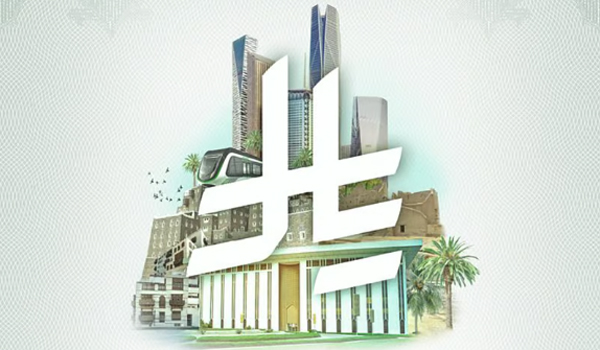
റിയാദ് : സൗദി റിയാലിന് പുതിയ ചിഹ്നം പ്രഖ്യാപിച്ച് സൗദി അറേബ്യ. ദേശീയ കറൻസിയുടെ ഐഡന്റിറ്റി ശക്തിപ്പെടുത്തുന്നതിനുള്ള നടപടിയുടെ ഭാഗമായാണ് പുതിയ ചിഹ്നം അവതരിപ്പിച്ചത്. അറബിക് കാലിഗ്രാഫിയിൽ നിന്നും പ്രചോദനം ഉൾക്കൊണ്ടുള്ള ഒരു രൂപകൽപ്പനയാണ് ചിഹ്നത്തിൽ ഉപയോഗിച്ചിരിക്കുന്നത്.
പുതിയ ചിഹ്നം പുറത്തിറക്കിയ വേളയിൽ, സെൻട്രൽ ബാങ്ക് ഗവർണർ അയ്മാൻ അൽ സയാരി, രാജാവ് സൽമാൻ ബിൻ അബ്ദുൽ അസീസിനും കിരീടാവകാശിക്കും നന്ദി അറിയിച്ചു. റിയാൽ ചിഹ്നം പ്രാദേശിക, രാജ്യാന്തര തലങ്ങളിൽ രാജ്യത്തിന്റെ സാമ്പത്തിക ഐഡന്റിറ്റിക്ക് കരുത്തേകുമെന്നും അദ്ദേഹം പറഞ്ഞു. പുതിയ ചിഹ്നം ഉടൻ തന്നെ ഉപയോഗത്തിൽ വരുത്തുമെന്നും സാമ്പത്തിക, വാണിജ്യ ഇടപാടുകളിൽ ഇത് ക്രമേണ പ്രതിഫലിക്കുമെന്നും അദ്ദേഹം കൂട്ടിച്ചേർത്തു.
ദേശീയ സ്വത്വത്തിലും സാംസ്കാരിക ബന്ധത്തിലും അഭിമാനം വളർത്തുക, സൗദി റിയാലിന്റെ പദവി ഉയർത്തിക്കാട്ടുക, ആഗോള സമ്പദ്വ്യവസ്ഥയിൽ രാജ്യത്തിന്റെ സ്ഥാനം തെളിയിക്കുക എന്നിവയാണ് ചിഹ്നത്തിന്റെ ലക്ഷ്യങ്ങൾ.
Sources:globalindiannews
Saudi Arabia has introduced a new symbol for its local currency as part of efforts to establish the kingdom as a global financial hub.
The design, made up of Arabic calligraphy of the word riyal, will be implemented gradually for use in financial and commercial transactions, according to a statement from the country’s central bank.
The Saudi riyal has been pegged to the US Dollar since 1986 and is set at a fixed exchange rate of 3.75 riyals per $1. The peg has long helped the country facilitate international trade and investment, and serves the country’s broad Vision 2030 agenda to diversify the economy.
Under Crown Prince Mohammed bin Salman, the government has been spending hundreds of billions of dollars on everything from new cities to sports, tourism and technology. Saudi Arabia has also attracted hundreds of companies including Goldman Sachs Group Inc. and BlackRock Inc. to set up offices in Riyadh as it seeks to develop the capital into the Middle East’s premier business destination.
http://theendtimeradio.com
world news
കോംഗോയിലെ ദേവാലയത്തില് 70 ക്രൈസ്തവരെ ഇസ്ലാമിക് സ്റ്റേറ്റ്സ് തീവ്രവാദികള് കഴുത്തറത്ത് കൊലപ്പെടുത്തി
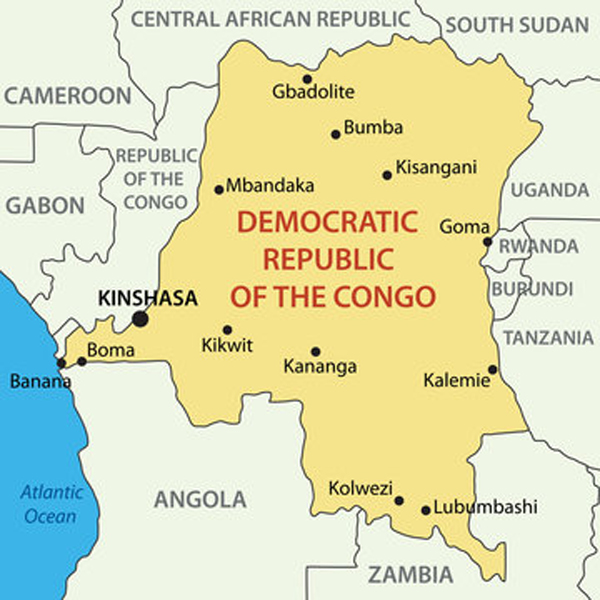
ബ്രാസാവില്ല: ആഫ്രിക്കന് രാജ്യമായ ഡെമോക്രാറ്റിക് റിപ്പബ്ലിക് ഓഫ് കോംഗോയിലെ ക്രൈസ്തവ ആരാധനാലയത്തില് എഴുപത് ക്രിസ്ത്യാനികളെ ശിരഛേദം ചെയ്ത നിലയിൽ കണ്ടെത്തി. രാജ്യത്തിൻ്റെ വടക്ക് കിഴക്കൻ ഭാഗത്ത് ക്രൈസ്തവ വിശ്വാസികൾക്ക് നേരെ നടന്ന ഏറ്റവും പുതിയ ആക്രമണമാണിതെന്ന് വിവിധ പ്രാദേശിക മാധ്യമങ്ങള് റിപ്പോര്ട്ട് ചെയ്യുന്നു. ഫെബ്രുവരി 13 വ്യാഴാഴ്ച പുലർച്ചെ 4 മണിയോടെ, ഇസ്ലാമിക് സ്റ്റേറ്റ്സുമായി ബന്ധമുള്ള സഖ്യകക്ഷികളായ ഡെമോക്രാറ്റിക് ഫോഴ്സിലെ (എഡിഎഫ്) തീവ്രവാദികളാണ് ആക്രമണം നടത്തിയത്.
എഡിഎഫ് തീവ്രവാദികൾ ഗ്രാമം വളഞ്ഞു 50 ക്രൈസ്തവ വിശ്വാസികളെ കൂടി പിടികൂടി. പിന്നീട് ഇരുപതു പേരെ കൂടി ബന്ദികളാക്കി 70 പേരെയും കസങ്കയിലെ പ്രൊട്ടസ്റ്റൻ്റ് ആരാധനാലയത്തില് കൊണ്ടുപോയി ദാരുണമായി കഴുത്ത് അറത്ത് കൊലപ്പെടുത്തുകയായിരിന്നുവെന്ന് വിവിധ മാധ്യമങ്ങള് റിപ്പോര്ട്ട് ചെയ്യുന്നു. ക്രൈസ്തവ നരഹത്യ അരങ്ങേറി ദിവസങ്ങള്ക്ക് ശേഷമാണ് പുറംലോകം വാര്ത്ത അറിയുന്നത്. സുരക്ഷ സാഹചര്യം താറുമാറായ പശ്ചാത്തലം കണക്കിലെടുത്ത് സംഭവത്തിന് മുന്പ്, പള്ളികളും സ്കൂളുകളും ആരോഗ്യ കേന്ദ്രങ്ങളും അടച്ചിരുന്നുവെന്ന് കോംബോ പ്രൈമറി സ്കൂൾ ഡയറക്ടർ മുഹിന്ദോ മുസുൻസി വെളിപ്പെടുത്തി.
രാജ്യത്തിൻ്റെ വടക്ക് കിഴക്കൻ മേഖലയിൽ എഡിഎഫ് തീവ്രവാദികൾ ഉയർത്തുന്ന ഭീഷണിയുടെ തുടർച്ചയാണ് ഏറ്റവും പുതിയ ഈ ദാരുണ സംഭവം. 2014-ൽ, നോർത്ത് കിവു പ്രവിശ്യയിലെ ബെനി പ്രദേശത്ത് സംഘം ആക്രമണം ശക്തമാക്കിയിരിന്നു. അതിനുശേഷം ആക്രമണങ്ങൾ ഇറ്റുരി പ്രവിശ്യയിലെ ഇരുമു, മംബസ പ്രദേശങ്ങളിലേക്ക് വ്യാപിച്ചു. കഴിഞ്ഞ മാസത്തിൽ മാത്രം, ബസ്വാഘ മേഖലയില് ഇരുനൂറിലധികം പേരെ സംഘം കൊന്നു. കഴിഞ്ഞ വർഷം, കോംഗോയില് 355 ക്രൈസ്തവരാണ് വിശ്വാസത്തിൻ്റെ പേരിൽ കൊല്ലപ്പെട്ടത്. മുൻ വർഷം 261 ആയിരുന്നു.
അതേസമയം 10,000 സാധാരണക്കാര് ആഭ്യന്തരമായി കുടിയൊഴിപ്പിക്കപ്പെട്ടു. ക്രൈസ്തവര് തിങ്ങി പാര്ത്തിരിന്ന നിരവധി ക്രിസ്ത്യൻ ഗ്രാമങ്ങൾ പൂർണ്ണമായും ഉപേക്ഷിക്കപ്പെട്ടു. റുവാണ്ടയുടെ പിന്തുണയുള്ള M23 വിമത ഗ്രൂപ്പാണ് സമീപകാല ആക്രമണങ്ങളില് ക്രൈസ്തവര്ക്ക് വലിയ ഭീഷണി ഉയര്ത്തിക്കൊണ്ടിരിക്കുന്നത്. കഴിഞ്ഞ വര്ഷം കോംഗോയില് ഇസ്ലാം മതം സ്വീകരിക്കാൻ വിസമ്മതിച്ചതിനെ തുടർന്ന് ഇസ്ലാമിക് സ്റ്റേറ്റ്സുമായി ബന്ധമുള്ള അക്രമികള് കത്തോലിക്ക വിശ്വാസികളെ കൊലപ്പെടുത്തിയ സംഭവത്തെ അപലപിച്ച് ഫ്രാന്സിസ് പാപ്പ രംഗത്ത് വന്നിരിന്നു.
കടപ്പാട് :പ്രവാചക ശബ്ദം
Christians in DRC have again been left reeling after a heinous act of violence that has left 70 believers dead. Please pray for our brothers and sisters in the country as they face escalating persecution.
Seventy Christians have been found beheaded in a church in the Democratic Republic of Congo (DRC), in what’s the latest devastating attack on believers in the north east of the country.
According to field sources, at around 4am last Thursday (13 February) suspected militants from the Allied Democratic Forces (ADF) – a group with ties to so-called Islamic State (IS) – approached homes in Mayba in the territory of Lubero, saying: “Get out, get out and don’t make any noise.” Twenty Christian men and women came out and were captured.
Shaken by this incident, people from the local community in Mayba later gathered to work out how to release those held captive. However, ADF militants surrounded the village and captured a further 50 believers.
All 70 of those kidnapped were taken to a Protestant church in Kasanga where they were tragically killed.
Muhindo Musunzi, director of the Kombo primary school [which belongs to the CECA20 church], says that prior to this incident, churches, schools and health centres had all shut their doors because of the chaotic security situation. “We had to move all activities towards Vunying,” he said.
Field sources report that, until Tuesday 18 February, some families had not been able to bury their dead because of insecurity in the area. Many Christians have now fled the area for their safety.
“We don’t know what to do or how to pray; we’ve had enough of massacres,” says an elder of the CECA20 church. “May God’s will alone be done.”
Rise in violence and internal displacement
This latest awful incident is a continuation of the escalating threat posed by ADF militants in the country’s north east region. In 2014, the group intensified attacks in Beni territory in North Kivu province, and since then attacks have spread to the territories of Irumu and Mambasa in Ituri province, and now it’s affecting Lubero. In the last month alone, the group have killed more than 200 people in Baswagha chiefdom, according to a local news website.
This explains why DRC rose six places to number 35 in the latest World Watch List. Last year, 355 were killed for their faith, compared with 261 the previous year, whilst an estimated 10,000 were internally displaced, which is ten times more than 2023. Houses have been looted and burnt, schools relocated, churches and health facilities closed, and several Christian villages have been abandoned altogether. The recent activities of the M23 rebel group, reportedly supported by Rwanda, has added to the vulnerability of Christians.
A call to remain in prayer
“Open Doors strongly condemns this heinous act of violence against civilians and calls upon civil societies, governments and international organisations to prioritise civilian protection in eastern DRC where armed groups, such as the ADF, are operating,” says John Samuel*, Open Doors’ legal expert for the work in sub-Saharan Africa.
“The violence takes place in a context of impunity, where almost no one is held accountable,” he continues. “This massacre is a clear indicator of widespread human rights violations against civilians and vulnerable communities, often targeting Christians, perpetrated by ADF – called Islamic State affiliate.”
“We further call on the international Christian community to remain in prayer for Christians and vulnerable communities in eastern DRC,” adds John Samuel. “Pray for an end to violence and that government at all levels will diligently, impartially, and transparently address the violence and its effects. Pray for the church in Lumbero as she seeks to bring physical and spiritual assistance to the families affected.
-

 Travel9 months ago
Travel9 months agoയാക്കൂസ കരിഷ്മ:ഓല സ്കൂട്ടറിനേക്കാൾ വിലക്കുറവിൽ കുഞ്ഞൻ കാർ; സിറ്റി യാത്രകൾക്ക് ഇനി ഇവൻ മതിയാവും
-

 Movie3 months ago
Movie3 months agoFor KING + COUNTRY Stars’ Big Plan to Bring Message of Jesus, ‘Redemption of Humanity’ to People Across America
-
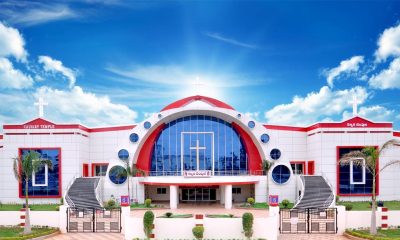
 National12 months ago
National12 months ago300,000-Member Indian Church to Plant 40 More Megachurches
-

 National12 months ago
National12 months agoനെയ്തേലിപ്പടി ക്രൂസേഡിന് അനുഗ്രഹീത സമാപ്തി
-

 Tech8 months ago
Tech8 months agoചിത്രങ്ങൾ എഡിറ്റ് ചെയ്യാം; വാട്സ്ആപ്പിലെ ‘നീല വളയം’ സ്മാർട്ടാകുന്നു, കാര്യമായ മാറ്റങ്ങൾ
-

 Movie3 months ago
Movie3 months agoFor KING + COUNTRY Stars’ Big Plan to Bring Message of Jesus, ‘Redemption of Humanity’ to People Across America
-

 Movie11 months ago
Movie11 months agoActor Ryan Phillippe ‘Craving’ Relationship With God After Movie About Christian Missionary
-

 Articles9 months ago
Articles9 months ago8 ways the Kingdom connects us back to the Garden of Eden



